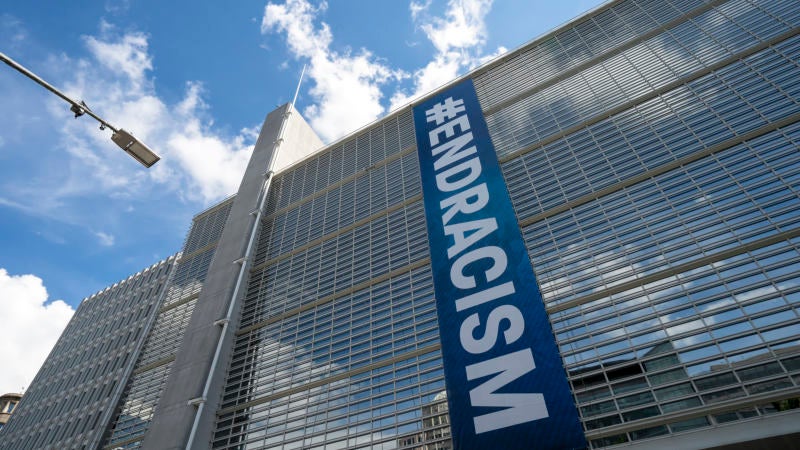As our annual Law, Justice, and Development Week draws to a close, I am proud that we are launching publicly the first World Bank Group Anti-Racism Charter. The Charter is an aspirational, non-binding document, and a significant milestone in our ongoing work to tackle racism and racial discrimination in our workplaces, development work, and local communities. Let me explain how it fits into our efforts, and what it means for us going forward.
Last year, amid worldwide protests after the killing of George Floyd in the United States, World Bank Group President David Malpass asked me to set up and chair an Anti-Racism Task Force, with a clear mandate to deliver recommendations to senior management that address racism and racial discrimination across the organization as well as in our development work and our communities. As David emphasized, “Racial discrimination and social injustice have no place in any of our workplaces or societies.”
We kicked off with a call for volunteers to join the Task Force, from among our staff at headquarters in Washington, D.C., and our offices around the world. We also launched our first-ever staff survey on the issue of race, with impressive participation – about 70 percent of staff; this generated over 6,000 comments on perceptions, personal experiences, and institutional actions. The Task Force brought together 54 colleagues from diverse backgrounds and all regions who devoted their time and effort to collect and analyze input from colleagues, brainstorm solutions, and come up with recommendations to break barriers and tackle racism – all on top of their work and family responsibilities and amid a global pandemic.
"Changing culture and behavior in a meaningful and sustainable way takes time, and the World Bank Group is firmly committed to staying the course for steady progress."
I believe this level of engagement from our staff reflects how personally – and pervasively – racism and racial discrimination have touched our individual lives. While each colleague’s story is unique, I can speak to my own early experiences, growing up in the United Kingdom – in Balham, South London – as a daughter of immigrants from Nigeria and Trinidad. When I was just seven, I announced to my teacher that I intended to become a judge one day, only to be told that “little Black girls from Balham don’t become judges.”
I refused to accept limitations because of my gender and skin color; instead, I used perceptions like my teacher’s to reinforce my determination that I would overcome challenges and meet my full potential. I was able to succeed in this. But by contrast, for many millions of children worldwide, racism and racial discrimination do starkly limit what is possible, while growing up and throughout their lives. Sadly, racism and racial discrimination persist and continue to harm lives and limit opportunity.
Our Task Force looked first at issues in the workplace, coming up with 80 recommendations for David Malpass and senior management, on ways that the World Bank Group can combat racism and racial discrimination. These are currently being prioritized. The new Charter stems from one of these recommendations. The President's Office and my Office of the General Counsel took the lead in producing it, drawing on input from across our organization. It’s now available here in eight languages.
The Charter is an important milestone that signals our long-term commitment to anti-racism. It clearly articulates our stance on racism and racial discrimination, and it reinforces our vision of the institution we aspire to be. It helps point the way to greater racial equity, both within our organization and as we look closely at our development work and community engagement.
"We must all stand together – and with the international community – to ensure that racial equality is integral to our workplace and communities, where each of us can feel respected, safe, and valued."
Changing culture and behavior in a meaningful and sustainable way takes time, and the World Bank Group is firmly committed to staying the course for steady progress. As part of our work to shift culture, the Task Force has hosted events with experts from outside the organization and has developed a series of tools, including online guides to help staff hold often challenging conversations about race and respond to discriminatory situations. I’m especially encouraged that many of our staff are finding effective ways to discuss racial equity and address issues of racism and racial discrimination with their teams and colleagues. These are the beginnings of what we hope will be real change, and the Charter gives these efforts a clear and uncompromising direction.
We must all stand together – and with the international community – to ensure that racial equality is integral to our workplace and communities, where each of us can feel respected, safe, and valued. And where one day, little girls from Balham or anywhere in the world can share their dreams with their teachers and count on truly boundless encouragement to reach their potential.



Join the Conversation